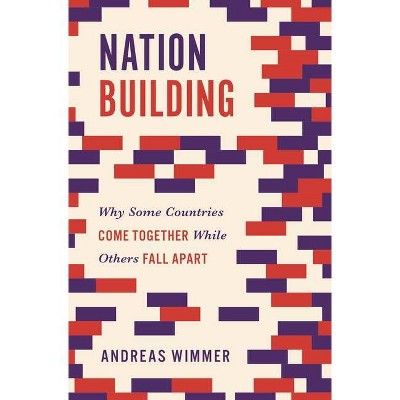Nation Building - (Princeton Studies in Global and Comparative Sociology) by Andreas Wimmer (Paperback)

Similar Products
Products of same category from the store
AllProduct info
<p/><br></br><p><b> About the Book </b></p></br></br>" A new and comprehensive look at the reasons behind successful or failed nation building Nation Building presents bold new answers to an age-old question. Why is national integration achieved in some diverse countries, while others are destabilized by political inequality between ethnic groups, contentious politics, or even separatism and ethnic war? Traversing centuries and continents from early nineteenth-century Europe and Asia to Africa from the turn of the twenty-first century to today, Andreas Wimmer delves into the slow-moving forces that encourage political alliances to stretch across ethnic divides and build national unity. Using datasets that cover the entire world and three pairs of case studies, Wimmer's theory of nation building focuses on slow-moving, generational processes: the spread of civil society organizations, linguistic assimilation, and the states' capacity to provide public goods. Wimmer contrasts Switzerland and Belgium to demonstrate how the early development of voluntary organizations enhanced nation building; he examines Botswana and Somalia to illustrate how providing public goods can bring diverse political constituencies together; and he shows that the differences between China and Russia indicate how a shared linguistic space may help build political alliances across ethnic boundaries. Wimmer then reveals, based on the statistical analysis of large-scale datasets, that these mechanisms are at work around the world and explain nation building better than competing arguments such as democratic governance or colonial legacies. He also shows that when political alliances crosscut ethnic divides and when most ethnic communities are represented at the highest levels of government, the general populace will identify with the nation and its symbols, further deepening national political integration. Offering a long-term historical perspective and global outlook, Nation Building sheds important new light on the challenges of political integration in diverse countries"--<p/><br></br><p><b> Book Synopsis </b></p></br></br><p><b>A new and comprehensive look at the reasons behind successful or failed nation building</b> <p/><i>Nation Building</i> presents bold new answers to an age-old question. Why is national integration achieved in some diverse countries, while others are destabilized by political inequality between ethnic groups, contentious politics, or even separatism and ethnic war? Traversing centuries and continents from early nineteenth-century Europe and Asia to Africa from the turn of the twenty-first century to today, Andreas Wimmer delves into the slow-moving forces that encourage political alliances to stretch across ethnic divides and build national unity. <p/>Using datasets that cover the entire world and three pairs of case studies, Wimmer's theory of nation building focuses on slow-moving, generational processes: the spread of civil society organizations, linguistic assimilation, and the states' capacity to provide public goods. Wimmer contrasts Switzerland and Belgium to demonstrate how the early development of voluntary organizations enhanced nation building; he examines Botswana and Somalia to illustrate how providing public goods can bring diverse political constituencies together; and he shows that the differences between China and Russia indicate how a shared linguistic space may help build political alliances across ethnic boundaries. <p/>Wimmer then reveals, based on the statistical analysis of large-scale datasets, that these mechanisms are at work around the world and explain nation building better than competing arguments such as democratic governance or colonial legacies. He also shows that when political alliances crosscut ethnic divides and when most ethnic communities are represented at the highest levels of government, the general populace will identify with the nation and its symbols, further deepening national political integration. <p/>Offering a long-term historical perspective and global outlook, <i>Nation Building</i> sheds important new light on the challenges of political integration in diverse countries.</p><p/><br></br><p><b> From the Back Cover </b></p></br></br><p>"This fluent and powerful book demonstrates at the deepest level that early state formation rests on ethnic and linguistic homogenization--and this, together with the presence of civil society alliances that crosscut a territory, allows for successful nation building. Wimmer is a great sociologist at the top of his profession, producing a work of immense sophistication that exhibits all his gifts."<b>--John A. Hall, McGill University</b></p><p>"Wimmer stands among the most solid and convincing of macrocomparative researchers, and he is as close to the ideal of an impartial social scientist as one can find. His theories of nation building are a revelation."<b>--Randall Collins, University of Pennsylvania</b></p><p/><br></br><p><b> Review Quotes </b></p></br></br><br>Co-Winner of the Barrington Moore Book Award, Comparative-Historical Sociology Section of the American Sociological Association<br><br>In this fascinating account of state- and nation-building across time and space, Wimmer does a great job in convincing readers of the explanatory value of his theory.<b>---Sean Mueller, <i>Regional and Federal Studies</i></b><br><br>Winner of the Stein Rokkan Prize, European Consortium for Political Research<br><p/><br></br><p><b> About the Author </b></p></br></br><b>Andreas Wimmer</b> is the Lieber Professor of Sociology and Political Philosophy at Columbia University. His books include <i>Waves of War</i> and <i>Ethnic Boundary Making</i>.
Price History
Cheapest price in the interval: 27.99 on October 27, 2021
Most expensive price in the interval: 27.99 on November 8, 2021
Price Archive shows prices from various stores, lets you see history and find the cheapest. There is no actual sale on the website. For all support, inquiry and suggestion messagescommunication@pricearchive.us




















